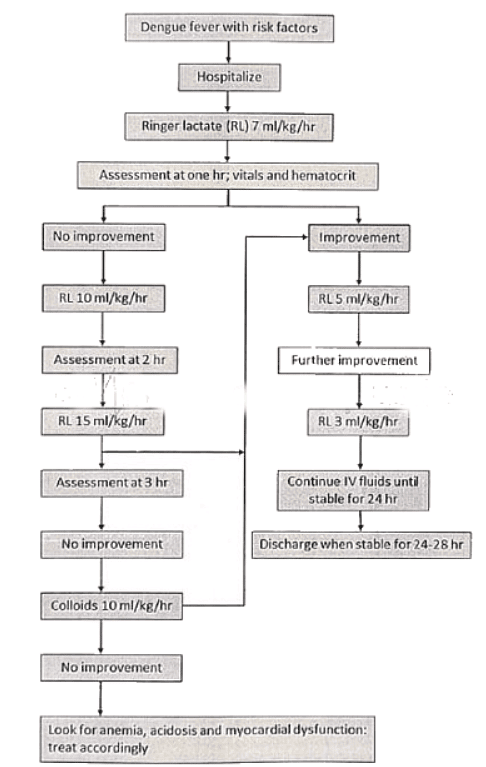Dengue | Medical Science Optional Notes for UPSC PDF Download
| Table of contents |

|
| Management of Dengue |

|
| Severe Dengue |

|
| Warning signs |

|
| Dengue management |

|
| Admission criteria |

|
| Discharge criteria |

|
| Dengvaxia |

|
Management of Dengue

Severe Dengue
- Severe plasma leakage resulting in:
- Shock
- Accumulation of fluids causing respiratory distress
- Severe bleeding, as assessed by the clinician
- Severe organ involvement:
- Liver: Elevated AST or ALT levels exceeding 1000 IU/L
- Central Nervous System (CNS): Impaired consciousness
- Heart and other organs affected
Warning signs
- Abdominal pain or tenderness
- Persistent vomiting
- Clinical evidence of fluid accumulation
- Mucosal bleeding
- Lethargy and restlessness
- Liver enlargement exceeding 2 cm
- Laboratory indicators such as an increase in packed cell volume (hematocrit) along with a rapid decline in platelet count
Dengue management

Algorithm for management of severe dengue fever. DSS dengue shock syndrome

Prophylactic platelet transfusion can be done in thrombocytopenic patients with platelet count less than 10000/cumm and associated hemorrhagic manifestations with count more the above label. There is little evidence to support the practice of transfusing platelet concentrates and/or fresh- frozen plasma for severe bleeding.
There is little evidence to support the practice of transfusing platelet concentrates and/or fresh- frozen plasma for severe bleeding.
Admission criteria
Warning Signs: Clinical
- Abdominal pain or tenderness
- Persistent vomiting
- Clinical fluid accumulation
- Mucosal bleeding
- Lethargy, restlessness
- Liver enlargement (>2 cm)
- Laboratory features indicating an increase in hematocrit (HCT) concurrent with a rapid decrease in platelet count
Signs and Symptoms Related to Hypotension (Possible Plasma Leakage)
- Dehydrated patient, unable to tolerate oral fluids
- Dizziness or postural hypotension
- Profuse perspiration, fainting, prostration during defervescence
- Hypotension or cold extremities
Bleeding
- Spontaneous bleeding, independent of platelet count
Organ Impairment
- Renal, hepatic, neurological, or cardiac impairment
- Enlarged, tender liver, although not yet in shock
- Chest pain or respiratory distress, cyanosis
Findings through Further Investigations
- Rising hematocrit
- Pleural effusion, ascites, or asymptomatic gallbladder thickening
Coexisting Conditions
- Pregnancy
- Comorbid conditions such as diabetes mellitus, hypertension, peptic ulcer, hemolytic anemias, and others
- Overweight or obese (rapid venous access difficult in an emergency)
- Infancy or old age
Social Circumstances
- Living alone
- Living far from health facility
- Without reliable means of transport
Discharge criteria
- Clinical: No fever observed for the past 48 hours.
- Improvement in clinical status:
- Enhanced general well-being
- Improved appetite
- Stable hemodynamic status
- Adequate urine output
- Absence of respiratory distress.
- Laboratory:
- Platelet count showing a consistent increasing trend.
- Hematocrit remains stable without the need for intravenous fluids.
Dengvaxia
- The U.S. Food and Drug Administration (FDA) has granted approval for Dengvaxia, making it the first vaccine sanctioned for preventing dengue disease caused by all four dengue virus serotypes (1, 2, 3, and 4).
- The approved age group for Dengvaxia is individuals aged 9 through 16 who have a laboratory-confirmed history of previous dengue infection and reside in endemic areas.
Dosage
- Dengvaxia is a live, attenuated vaccine administered through three separate injections.
- The initial dose is followed by two additional shots given six and twelve months later.
Contraindications
- Dengvaxia is not authorized for use in individuals without a prior infection by any dengue virus serotype or for those with unknown infection history.
- In individuals not previously infected, Dengvaxia mimics a first dengue infection, potentially leading to severe dengue disease upon subsequent infection with wild-type dengue virus.
- Health care professionals must assess individuals for prior dengue infection before vaccination.
- Prior infection can be confirmed through medical records of a laboratory-confirmed dengue infection or serological testing using blood samples.
Side Effects
Commonly reported side effects among Dengvaxia recipients include:
- Headache
- Muscle pain
- Joint pain
- Fatigue
- Injection site pain
- Low-grade fever
|
7 videos|219 docs
|
FAQs on Dengue - Medical Science Optional Notes for UPSC
| 1. What are the warning signs of severe dengue? |  |
| 2. How should dengue be managed? |  |
| 3. What are the admission criteria for dengue patients? |  |
| 4. What are the discharge criteria for dengue patients? |  |
| 5. What is Dengvaxia and how is it related to dengue management? |  |

|
Explore Courses for UPSC exam
|

|
















